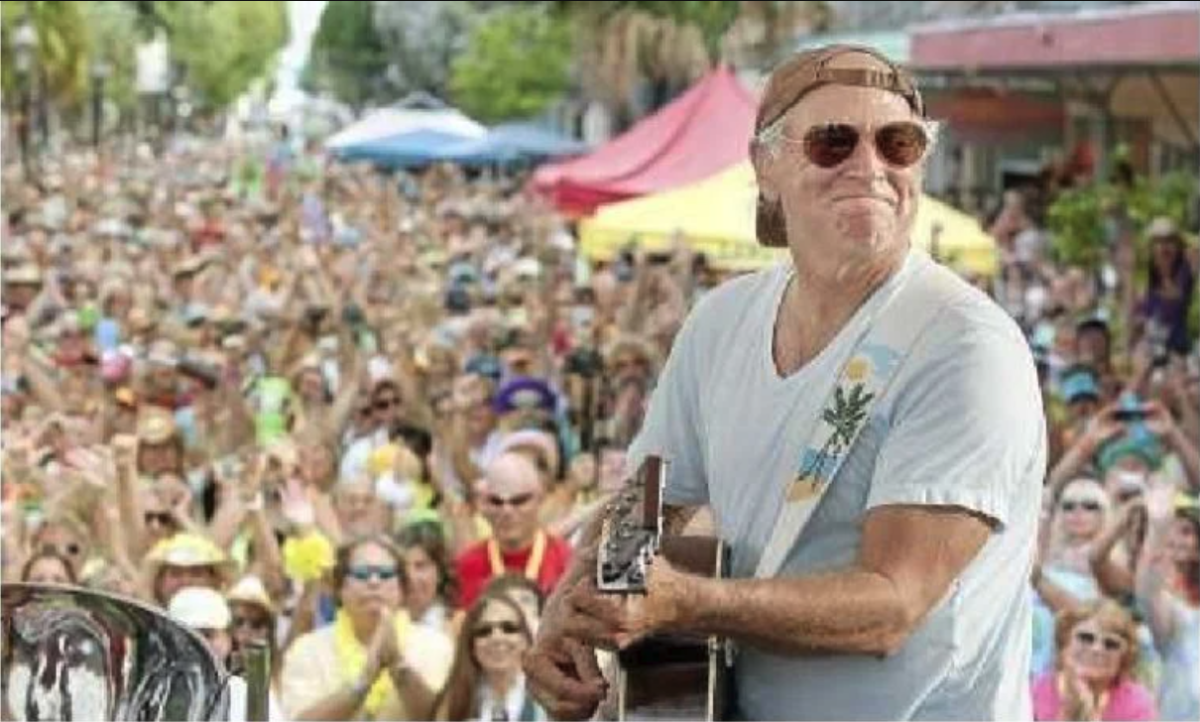The Big Picture –
By Glynn Wilson –
WASHINGTON, D.C. — When Jimmy Buffett had his only Top 10 hit with “Margaritaville” in 1977, searching for that lost shaker of salt for the Mexican booze in the blender helping him to hang on, I was smoking and boozing it up a little in bars myself in those heady days, trying to figure out how to make it in the rock and roll business. But by the time I first saw the Coral Reefer Band in concert in Tuscaloosa, it was 1983 and I had moved on to journalism myself.
If you are aware of his life story, you know that before he was anybody in the music business, he was in Nashville trying to break into country music, but took a job free-lancing for Billboard magazine after seeing an ad in The Nashville Banner. For a brief time he wrote about the music scene there as well as what was going on in Muscle Shoals, Alabama and Macon, Georgia. Buffett had obtained a bachelor’s degree in history with a minor in journalism in 1969 from Pearl River Community College and the University of Southern Mississippi in Hattiesburg, after flunking out at Auburn.
Buffett died on Friday at the age of 76, according to his feature obituary in the New York Times, which described him as a “singer, songwriter, author, sailor and entrepreneur whose roguish brand of island escapism on hits like ‘Margaritaville’ and ‘Cheeseburger in Paradise’ made him something of a latter-day folk hero, especially among his devoted following of so-called Parrot Heads…”
It was not revealed where he died or the cause of death. He had rescheduled a series of concerts this spring after being hospitalized, although his coterie of hangers on and handlers offered no details at first.
Add: It was later reported that he died in Sag Harbor, Long Island on Friday. He had been fighting Merkel Cell Skin Cancer for four years.
There is no doubt that the image he created of himself as a hippie, beach bum, ne’er-do-well who liked to hang out at the beach, get drunk and smoke weed, led to one of the most financially successful music careers of the last half of the 20th century. Forbes claims he was worth $1 billion, not just from album sales and concert tours but successful merchandizing of his Parrot Head brand, including a chain of restaurants.
His capitalist empire was already fully formed when I first saw him in ’83, and I had a run in with his management that soured me on the guy from then on. If he was such a nice guy who you would want to have a beer and a joint with at the beach, with a background in journalism himself, I had to ask myself at the time, why would you turn down a request from a local reporter with the college newspaper to a quick interview backstage and a picture?
In fact, his handlers literally tried to ban anyone from getting into Coleman Coliseum with a camera to protect his funky “brand.” He was one of the first musicians to restrict access to the press in those days. I snuck in a camera and got pictures for the paper anyway, but no interview, even though I had already interviewed Greg Allman of the Allman Brothers Band that year, who I considered a more worthy rock star anyway.
Later on, when I found myself writing for a chain of papers on the Gulf Coast — some of his old stomping grounds from Mobile to the Pink Pony Pub in Gulf Shores and the Flora-Bama Roadhouse Lounge on the Florida line — I tried to get to him one more time. He was supposedly an avid golfer, but he must have been a country club sort, since I tried to get him to play a round of golf with me for a story. One of my feature ideas was to play every golf course in the area and write reviews of them all, which I did.
But there would be no funny Jimmy Buffett golf wisdom for the stories. Apparently he didn’t have any, just a mammoth ego. He wouldn’t even bother to call back to refuse.
So I wrote him off as an asshole, and never listened to his dumbass music ever again. I mean there was nothing profound about it. He may have turned out to be brilliant at making money, like any shyster out of a Mark Twain novel. But the best I can tell, he really didn’t have anything at all of any note to say about the world. He liked to call himself an “artist,” but the best I can tell he was just another businessman in shorts, a T-shirt and sunglasses.
He famously hated hip hop music, and made comments that would be interpreted today as racist.
So forgive me if I do not cry over the death of Jimmy Buffett.
In a piece for the Times back in 1999, another writer revealed that Buffett was frequently dismissive of rap music in interviews and, in the song “Bob Robert’s Society Band,” he declares, “They don’t play grunge/ And they don’t play loud/ It’s the magic of the music/That still draws a crowd.”
“For Mr. Buffett’s largely older, overwhelmingly white, culturally besieged audience, those are words to live by,” the Times wrote. “Amassing economic power has replaced writing the great American novel in the new American Dream, and Jimmy Buffett has managed to drape that new dream in the seductively romantic mantle of the old one.”
Besides, when doing a little research for this piece, I listened to a web radio interview he did with this nobody named Bobby Bones, and he revealed that Buffett actually got the idea for “Margaritaville” in Austin, Texas, not in Key West or the crappy beaches in his home state of Mississippi down there where former Senate Majority Leader Trent Lott came from.
Anybody who would get drunk and wear a stupid looking hat on their head with a parrot on it must be a drunk ass Southerner anyway, who probably voted for Donald Trump.
I’ve spent some time in New Orleans myself as Buffett did, and I’ve got stories to tell about Trent Lott too.
Part 4: On Unfulfilled Hopes, Shattered Dreams and the Big Easy
___
If you support truth in reporting with no paywall, and fearless writing with no popup ads or sponsored content, consider making a contribution today with GoFundMe or Patreon or PayPal. We just tell it like it is, no sensational clickbait or pretentious BS.















Whoa Nellie…am I glad I read this- BEFORE this article, a new bar opened in this remote mountain town and people were literally crying in their beer about this death (which I did not understand). Last time we were in Mexico we witnessed volumes of people being ripped off at his franchise bars and masses of drunks giving new meaning to the word “ugly Americans.” With all those resources, I wonder what-if any-percentage went into the tourist trap towns that assisted their working poor? As a grateful recovering alcoholic, whenever I patronize bars, it is for overpriced coffee and all of our “vacations” feature volunteer work at places that focus giving disadvantaged populations opportunities to a better (drug-alcohol free) life…THOSE should be our real role models!